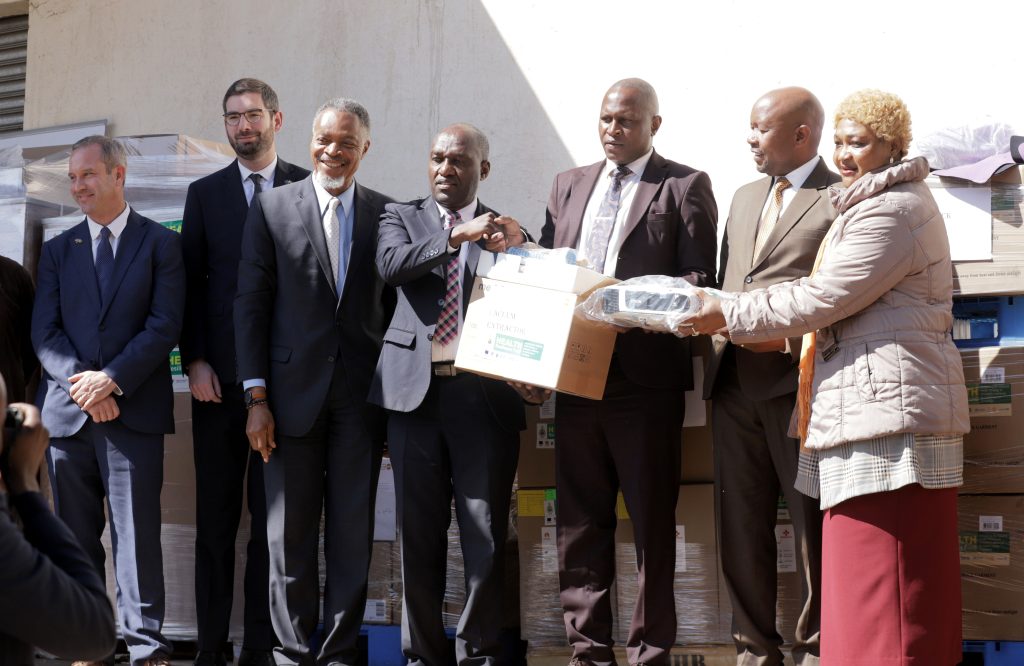
By Edward Makuzva
Harare, Zimbabwe – In a significant milestone for the country’s healthcare sector, the Health Resilience Fund (HRF) has handed over medical equipment and supplies worth USD $9.2 million to the Ministry of Health and Child Care (MOHCC) through the technical support of the United Nations Population Fund (UNFPA) and the United Nations Children’s Fund (UNICEF).
The handover ceremony, held at the National Pharmaceutical Warehouse in Harare, marks a significant stride in enhancing Zimbabwe’s healthcare infrastructure and services. The equipment and supplies, procured through the technical support of the United Nations Population Fund (UNFPA) and the United Nations Children’s Fund (UNICEF), will improve maternal and neonatal health outcomes across the country.
The HRF is a pooled fund that benefits from financial contributions under the coordination of the Ministry of Health and Child Care to improve health care for vulnerable mothers, new-borns, children and adolescents in Zimbabwe.
Its funding partners are the European Union, the Governments of Ireland and the United Kingdom, and Gavi, the Vaccine Alliance, while UNFPA, UNICEF and WHO are the technical partners of the Fund.
The Fund supports three health pillars: ending preventable maternal, newborn, child and adolescent deaths; global health security; and health systems strengthening.
Speaking at the handover ceremony, HRF Co-Chair and Programme Manager at the Embassy of Ireland, Dumisile Msimanga, emphasized the importance of equitable access to quality healthcare for all Zimbabweans.
“The provision of these advanced medical supplies and equipment is a cornerstone of our efforts to ensure that no one is left behind in the provision of basic essential health services,” said Msimanga.
Msimanga added that the HRF places a strong emphasis on sustainable and long-lasting investments that will stay on, well after the end of the programme, and what we are witnessing here today is a good example. Our commitment is to foster a resilient, responsive, and robust healthcare system.
The handover includes a comprehensive array of medical supplies and equipment includes ICT equipment, fistula repair kits, manual vacuum aspiration kits, anaesthetic machines, operating theatre tables, neonatal incubators, phototherapy machines, non-pneumatic anti-shock garments, tranexamic acid, oxytocin, maternal health commodities, cholera response supplies, essential medical commodities, and ready-to-use therapeutic food to treat malnutrition.
Speaking at the handover ceremony UNFPA Representative Ms. Miranda Tabifor said the lifesaving equipment and commodities will support Zimbabwe’s efforts in ending the deaths of women while giving life. At least 5 women die each day in child birth due to preventable causes.
“UNFPA remains unwavering in its commitment to supporting the Ministry of Health and Child Care in Zimbabwe. This handover is a testament to our ongoing partnership and our dedication to addressing critical gaps in maternal and newborn health services. The equipment and supplies provided today are not just items; they are the difference between life and death for women.” Tabifor explained.
UNICEF Representative Dr. Nicholas Alipui highlighted the value of the HRF citing the collaboration between the development and technical partners under the coordination of the MOHCC will help improve access to basic health services for the people of Zimbabwe.
“The procurement and distribution of these commodities and equipment will contribute to the quality of care and access to services, and the strengthening of the health system in Zimbabwe for women and children,” Dr. Alipui said.
Implemented through Government ministries and partners, the HRF is aligned to Zimbabwe’s National Development Strategy 1 (NDS1) and the National Health Strategy (NHS) 2021-2025.
Deputy Minister of Health and Child Care, Honourable Sleiman Kwidini, expressed gratitude to the funding partners of the Health Resilience Fund for their generous and timely support.
“These commodities and equipment are critical assets in our ongoing efforts to improve health outcomes for mothers and newborns across Zimbabwe.
“This support not only enhances our clinical capacities but also strengthens our overall health system resilience.
“The Health Resilience Fund is a powerful example of how strategic partnerships can drive sustainable improvements in healthcare delivery, ultimately leading to better health outcomes for all”, Kwidini explained.
This significant investment in Zimbabwe’s healthcare infrastructure is expected to have a lasting impact on the lives of women, adolescents, girls, and children who are at risk of being left behind in the provision of basic essential health services.

